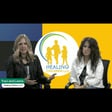Become a Creator today!Start creating today - Share your story with the world!
Start for free
00:00:00
00:00:01

Episode One: Why is Parentification Harmful?
In this first episode, Romona Jackson, founding president and CEO of The Women's Advocacy Center, discusses an important but often overlooked topic: Parentification.
Learn how parentified children face life-long challenges as adults and what signs to look out for if you know a child being forced to take on adult-like roles and responsibilities.
Transcript
Introduction to Guardians of Hope Podcast
00:00:08
Speaker
Welcome to the Guardians of Hope podcast, where we bring together parents, nonprofits, and legal experts dedicated to positively impacting children's lives. I'm Cynthia, host and creator. But before we begin, it's important that the audience knows this content should not be used as legal advice. The purpose of this podcast is to inform and unite.
00:00:32
Speaker
So please seek advice from your attorney or therapist to address your specific needs. The thoughts and opinions of my guests are not necessarily my own. This is a platform for sharing.
Guest Introduction: Ramona Jackson
00:00:45
Speaker
And speaking of guests, I'm really excited to welcome my very first guest, Ramona Jackson. Ramona is the founding president and CEO of the Women's Advocacy Center in Memphis, Tennessee. Ramona, thank you so much for joining me.
00:01:01
Speaker
Oh, Cynthia, it's my privilege. Thank you so much for having me today. All right. Well, let's get right to it.
What is Parentification?
00:01:08
Speaker
Ramona is here to discuss an important but often overlooked issue, parentification. According to the National Institution of Health, parentification occurs when a child is forced to assume developmentally inappropriate parent or adult-like roles and responsibilities.
00:01:27
Speaker
The child is regularly expected to provide emotional or practical support for a parent instead of receiving that support themselves. The role reversal of parentification can disrupt the natural process of maturing, causing long-term negative effects on a child's physical and mental health. Let's talk about this, Ramona. Can you elaborate on what this is and give us some examples? Sure, you did a great job of
00:01:57
Speaker
giving an overview of this topic that as you said is often overlooked. And I think sometimes it happens even subconsciously that parents are not or caregivers are not thinking about the fact that they're demonstrating this kind of behavior with their children. And it happens when parents are really looking to their children for the emotional and practical support that they should be getting from other adults.
00:02:25
Speaker
And instead of providing that emotional and practical support to their children, they're expecting their children to provide it to them. And so the child then becomes the caregiver. The child then becomes the one who is really parenting the parent. And children in this situation are forced to assume adult responsibilities and behaviors before they're ready to do so.
00:02:52
Speaker
Thank you, Ramona. So I did some research myself before we met, and I found some signs of what an adult might feel or look back on if they were parentified as a child. And some of these are growing up feeling like you had to be responsible.
00:03:10
Speaker
being pulled into arguments or issues between caregivers, not really remembering what it was like actually being a kid, having parents that had trouble caring for themselves, and they placed the responsibility on you as a child. There's so many listed here, but these are the signs that adults can reflect on, but what are some of the signs to look out for in children?
Roles of Parentified Children
00:03:39
Speaker
that are in this situation now? Yeah, I forgot to give you those examples when I was giving the overview of parentification earlier, but I do have some of those, and I hope that they'll be meaningful to your guests. So the types of parentification can be instrumental, which means that the child takes on practical responsibilities. And some examples of that are you have a young child that is responsible for caring for their siblings,
00:04:07
Speaker
or perhaps even other relatives because the parent is unable to do that. You might have a child in this situation that assumes housekeeping responsibilities. So they're responsible for the cleaning, for the cooking, maybe even for making a grocery list and actually forgetting those groceries delivered or going and picking those groceries up. In other instances, you might have a child who's responsible, believe it or not, for paying the bills.
00:04:33
Speaker
And you might see this maybe with teenagers where they have a parent who for one reason or the other doesn't want to take responsibility or is unable to take responsibility for paying the bills. And so the child then begins to take that responsibility just so that the rent is paid, so that the utilities are paid. And that really is not a responsibility that a young child or even really a teenager should have when there's a parent in the home to do those kinds of things.
00:05:02
Speaker
If the parentification is more emotional, you might have a child who is providing really strong emotional support to a parent who's going through a divorce, or maybe a parent who is having difficulty at work. And so the child then begins to offer advice to that parent, or the child could be mediating between a parent and another family member.
00:05:27
Speaker
And in many instances, you will find that the child is really just serving as a confidant to their parent. So there are adult things that the parent is dealing with, and maybe they're having thoughts about how to move through those adult issues that they're facing. And rather than talking those things over with another adult or with a counselor or therapist, they actually begin to use their child as the confidant. And any of these types of parentification can be
00:05:56
Speaker
I mean, there are long-term consequences that adults experience because of what they endured as a child who lived through some of these circumstances. One quick question on top of that, you know, you said these are long-term effects. I'm assuming that this trickles into adult relationships with peers, you know, romantic partners and even their own children.
00:06:26
Speaker
insight on that? Oh, absolutely.
Long-term Impacts of Parentification
00:06:29
Speaker
And you're right. It's not just that there could be difficulties in that initial parent-child relationship, but there could also be difficulties when that child grows up, becomes an adult and starts entering the workplace or they start entering into relationships of their own and having children of their own. It could make it difficult for them to trust.
00:06:55
Speaker
And that can show up in a number of ways. They could become involved in violent or unhealthy relationships. So they have a tendency to care give and they have a tendency to seek the incorrect kind of partner, unhealthy relationships. They might have difficulty functioning independently. So there is an excessive neediness that becomes part of that person's life. And it makes it difficult for them to be in healthy relationships with others.
00:07:23
Speaker
Those folks might also have a higher chance for some type of chronic illness, and they are at a greater risk for anxiety, depression, substance abuse disorders, and even eating disorders. And there are challenges to that person's self-esteem. Their identity is so linked to the identity of the parent and what the parent sees in them and what the parent needs from them and how important their role is to the parent
00:07:53
Speaker
they have difficulty forming their own identity and they have difficulty maintaining self-esteem apart from that parental relationship. So the long range impact to adults who have experienced parentification as children, it doesn't just impact them, it impacts other people with whom they interact. And that can be really tragic.
00:08:16
Speaker
It's so tricky, Ramona, especially with trying to intervene between a parent and child relationship.
How Can Harmful Behaviors Be Changed?
00:08:23
Speaker
But yes, how can someone help if they see this happening to someone that they know? I thought about that a lot in my reading and research and just in the work that we do at the Women's Advocacy Center, how do we help parents who
00:08:41
Speaker
might be demonstrating these behaviors and might be unaware that they're demonstrating the behaviors. And one of the ways that I think we've been able to kind of help parents navigate when they've been confronted with the fact that they are maybe demonstrating this behavior with their own child is to say, so this is a really heavy issue that it seems like you're dealing with, whether it's domestic abuse or divorce or some other really adult issue. And to ask the question,
00:09:11
Speaker
Who do you talk to when you have someone that you really need to kind of vent to or you need to unload on? Who is that confidant for you? And just listen to what they say to that answer. If their answer is really an adult that they can point to as someone that they can confide in and spend time with, then that's positive. If they are struggling with that and if they give any indication that, you know, really, you know, my kids and I, we just kind of,
00:09:39
Speaker
we talk about it and we figure it out together. That's a flag that goes up to me that says, well, maybe they're using that child as a confidant. And if I observed that in their relationship with their children, that there is an abundance of that child having adult responsibilities, I would just gently say, it seems like your son or your daughter is really doing a lot of things in the family that
00:10:06
Speaker
could be responsibilities for another adult. Have they talked with you about how they feel about that? Or have you asked your child how they feel about that? And then just listen to the response. It's really tricky, as you said, to intervene when there's that parent-child relationship. And again, I think part of it is because the parent may not be conscious of the fact that they are behaving in this way with their child. And they certainly may not think that it's harmful.
00:10:36
Speaker
I can remember times, even in my own childhood, there's a thought that, well, you're giving children these responsibilities and you're talking with them about adult things because you want them to grow up and you want them to be mature and you want them to be able to handle difficult situations. And all of that is true, but it needs to be age appropriate. If you have a 10 year old boy who is being responsible for giving his mom advice about how to manage through a divorce,
00:11:04
Speaker
That's really not age-appropriate, and that's not teaching that child how to handle difficult situations. It's actually teaching that child things that they shouldn't be learning at the age of 10. Exactly. It's such a delicate balance, right? Yeah, absolutely.
Support for Domestic Abuse Survivors
00:11:23
Speaker
You touched upon this a bit about your organization, but I wanted to ask you in detail, how does your organization help
00:11:33
Speaker
Well, the Women's Advocacy Center is we are in Shelby County. We're in Memphis, right outside of Memphis, Tennessee. And our our mission is to empower and support survivors of domestic abuse. And oftentimes when people hear that mission, they immediately think of adults. They think of women who have experienced domestic abuse. And we do help women. But we also serve children who have experienced domestic abuse because they're survivors as well.
00:12:03
Speaker
And we want to intervene in a positive manner in those children's lives so that we put them on a path that leads to fewer risks for things like mental illness and substance abuse or being victims of violence themselves or even becoming abusers. And all of that is tied up in what's commonly known as ACEs or Adverse Childhood Experiences. And so we're very cognizant of how ACEs impact children and the impact that
00:12:32
Speaker
ACEs that children experience transform them and cause them to have difficulties in their adult lives.
Programs for Healthy Relationships
00:12:40
Speaker
And so we try to offer recreational intervention to those children. We offer wraparound support services to the children and their moms, and that could include one-on-one coaching. It includes counseling. It includes educating the moms and the children on how to build healthy relationships.
00:12:57
Speaker
We have an emotionally-helping parenting seminar with three parts that we offer throughout the year. And then to do all of that, we raise funds through our fall gala that's coming up in a few weeks. It's called the Purple Party. And we encourage people to wear purple and to come and help us raise funds to support this work that we're doing to support survivors of domestic abuse.
00:13:23
Speaker
Ramona, thank you so much for sharing all of that information about an important topic, but also for sharing your mission with us. Well, thank you so much, Cynthia. It's great to be here. And I think you're
Advocating for Children's Needs
00:13:38
Speaker
doing a fabulous job to raise awareness about advocacy that needs to take place for children. Lots of people are advocating for all kinds of things across our country and really around the globe.
00:13:53
Speaker
I can't say enough about work that needs to be done to advocate for children and what they experience in their lives because oftentimes they are unable to clearly articulate, this is what I'm feeling. This is what I'm afraid of. This is where I hurt. And they need advocates. They need parents who advocate for them. They need nonprofit leaders who advocate for them and legal experts like the folks that you're going to have on your Guardians of Hope podcast.
00:14:22
Speaker
Thanks so much for offering this platform to do what's really needed in our communities. Absolutely. Thank you so much for that, Ramona. Learn more about Ramona's mission to empower and support survivors of domestic abuse by visiting her website, womensadvocacycenter.org.



















